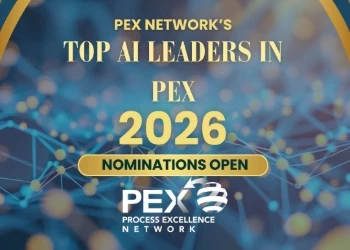Data quality & governance major AI obstacles, citizen development “pivotal” to digital transformation – PEX Research & Reports News
Work management process helps to sustain OPEX in the nuclear energy sector
Add bookmark
PEX Network’s weekly news bulletin rounds up the latest research, reports and publications in operational excellence (OPEX), digital transformation, artificial intelligence (AI) and automation, business process management (BPM), process mining and process intelligence and more.
This week includes:
- Lack of data quality and governance hinder AI implementation
- Businesses fear repercussions of inadequate AI governance
- Work management process sustains OPEX in nuclear energy
- Citizen development “pivotal” to achieving digital transformation goals
- APQC explores the state of process improvement efforts
Join the PEX Network community

Don't miss any news, updates or insider tips from PEX Network by getting them delivered to your inbox. Sign up to our newsletter and join our community of experts.
Learn MoreLack of data quality and governance hinder AI implementation
Data quality and governance are major obstacles to AI readiness for organizations. That’s according to the 2025 Outlook: Data Integrity Trends and Insights report from Precisely and Drexel University’s LeBow College of Business. The survey of more than 560 data and analytics professionals found that, while 60 percent of businesses think AI has a key influence on data programs, only 12 percent report sufficient data quality and accessibility for effective AI implementation. A lack of data governance is the primary data challenge inhibiting AI initiatives, cited by 62 percent of organizations, likely due to the role that data governance programs play in managing an organization’s data usage, according to the research.
“Our joint research with Drexel Lebow reveals a marked decline in organizations’ confidence in their data readiness despite the increase in importance of data-driven decision-making,” said Josh Rogers, CEO at Precisely. “To fully capitalize on the business benefits of analytics and AI, organizations need to invest in data integrity. Establishing a foundation of accurate, consistent and contextual data can serve to help them make informed decisions with confidence and truly realize the value of their AI initiatives.”
Tariq Munir, PepsiCo, discusses how to measure the impact of AI and intelligent automation
Businesses fear repercussions of inadequate AI governance
Separate research from Domino Data Lab reflected similar findings. The firm’s 2024 REVelate survey report uncovered a troubling disconnect between AI ambitions and the resources required to execute responsible AI governance. The survey, which included responses from 117 AI leaders, revealed that while 97 percent of organizations have set goals for responsible AI, nearly half (48 percent) are under-resourced to implement the necessary governance frameworks.
Almost half (43 percent) of respondents said that responsible AI is “extremely critical” to driving business outcomes, with regulatory violations the top concern for 49 percent of those polled. Beyond regulatory concerns, 46 percent of respondents fear reputational damage and stalled innovation if governance issues are not addressed, with 34 percent reporting increased operational expenses due to errors in poorly governed AI systems. However, 48 percent of respondents cited resource constraints as the biggest barrier to implementing effective AI governance, alongside having insufficient technology to govern AI (38 percent).
“Despite the growing recognition of responsible AI’s value, many enterprises are ill-equipped to enforce governance, risking financial penalties, reputational damage and stunted innovation,” commented Dr Kjell Carlsson, head of AI strategy at Domino Data Lab. “Combine the desire to scale AI to all parts of the business, with increasing regulation at an international, state and even municipal level, and it becomes more important than ever for organizations to govern the development and deployment of AI effectively.”
AI will be the biggest OPEX and business transformation investment area over the next 12 months, the PEX Report 2024/25 revealed.
Work management process sustains OPEX in nuclear energy
A new publication from the International Atomic Energy Agency (IAEA) set out specific ideas and practices for sustaining OPEX through an effective work management process in the nuclear industry. The aim is to preserve the gains made in safety, performance and cost and to address the factors that affect them, the paper read.
“Nuclear electricity generation has been facing critical economic challenges under a competitive electricity market. As a result, nuclear power plant owner/operator organizations now need to re-evaluate their business model and management processes to become more robust and resilient so nuclear generation can continue to play a role as a low carbon source of electricity.”
One of the key factors in overcoming economic challenges and sustaining OPEX in plant operation and management is an effective work management process, wrote the authors. This ensures that plant management can make the decision to use the right resources for the right task at the right time for the safe and efficient operation of a nuclear power plant.
“A work management process considers individual tasks for a given activity and connects with the organizations involved in the performance of the tasks to establish decision points and streamline the effective use of tools, methods and data,” the paper read. The effectiveness of work management processes must be continually and frequently evaluated, updated and maintained, and can be achieved by learning from worldwide good practices on work management processes and adapting and implementing effective processes quickly, it added.
Pradheep Kileti, National Grid, reflects on balancing operations and innovation
Citizen development “pivotal” to achieving digital transformation goals
Citizen development is a “pivotal strategy” for achieving digital transformation goals, according to new research from Kissflow. The firm’s 2024 Citizen Development Trends Report found that 92 percent of technology leaders think that citizen development – a business process that encourages non-IT-trained employees to become software developers using IT-sanctioned low-code/no-code platforms – is key to realizing digitalization ambitions. What’s more, 56 percent said that citizen development is a top and funded initiative, with 58 percent expecting to see more than a 10 percent increase in individual productivity.
Almost two-thirds (65 percent) of those polled stated that reduction in IT backlog is one of the top metrics to measure the outcome of citizen development, while 62 percent reporting that business has been greatly accelerated by empowering more employees to contribute. “If there is one obvious low-hanging fruit in digital transformation that also delivers $10 million in savings for a company of 1,000 employees over a three- to five-year period, it is citizen development,” said Suresh Sambandam, CEO of Kissflow.
APQC explores the state of process improvement efforts
The American Productivity & Quality Center (APQC) conducted a survey to understand process improvement programs in key areas. These include identifying which processes to improve, prioritizing and selecting which process improvement projects are worth employees’ time and the sustainability of process improvement projects. Lean is the process improvement methodology used most by organizations, the survey found.
Nearly one-fifth (19 percent) of surveyed organizations have a well-established and ingrained process improvement approach, while half have some kind of formal process improvement initiatives; according APQC. Just under one-third (30 percent) have ad hoc process improvement efforts.
The most common factors and tools used to prioritize competing process improvement opportunities are connection to organizational strategic objectives (53 percent), impact to the customer (internal or external) (43 percent) and potential return on investment (ROI) of the improvement (37 percent). When organizations see a process improvement effort that aligns with the strategic direction of the organization, they are more likely to prioritize that effort, APQC stated. Opportunities that are more closely tied to the strategy of the business overall become a much higher priority for the employees and the organization, it added.
Watch APQC's session on building and measuring effective process programs
READ MORE PEX RESEARCH & REPORTS NEWS
- LLMs generate process knowledge, more finance functions adopt AI
- AI reshapes BPM, process mining & digital transformation support sustainability
- FOMO drives AI adoption, process mining reveals valuable HR & well-being insights


























